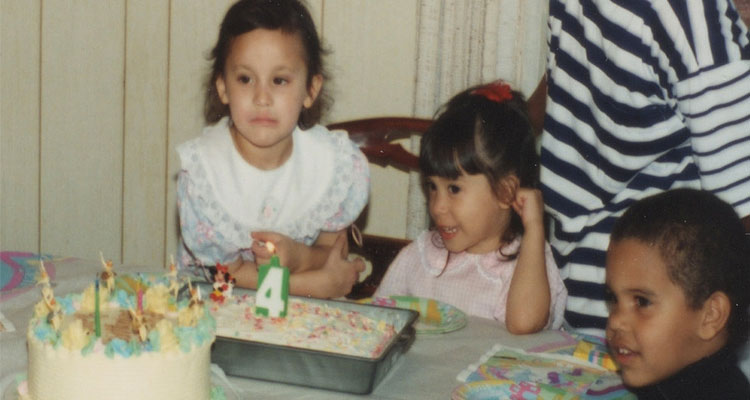Mention the name “Marielle Allschwang” and you’re mentioning a member of some of the best groups in Milwaukee. The singer-guitarist counts Hello Death and Collections Of Colonies Of Bees as two of her gigs; on top of that, there’s also her solo work. Allschwang’s still-stunning Dead Not Done was one of the best Milwaukee records of 2015, “full of Lynchian beauty and grace, and highlighted by Allschwang’s voice, one of the city’s best, twisting and turning in the wind.” Now, ahead of a new album with her band The Visitations (Kavi Laud, Ken Palme, Nathaniel Heuer, Adam Krause), Allschwang has released two new songs, “Marcus & Ramona” and “Married.”
One listen to “Marcus & Ramona”—and once glance at the album art—reveals an extremely personal song about childhood, family, and identity. At the risk of straight-up asking Allschwang “What is this song about?” we asked her to shed some light on the song’s subjects. Here’s what she told us:
There was a little collective of children my mom babysat every day while their parents were at work: nine preschool-age kids, including me. I was an only child—my father was, too—and my mom’s family was across an ocean (visits to the Philippines were a rare privilege for us), so these children became integral to my nucleus, and my self-becoming. They disrupted my solitude in the most wonderful ways; the first time I saw my mother play guitar and sing, we were all so excited, we ran from room to room of our house in a wild throng while she sang “Yankee Doodle” over and over…just to indulge us; they greeted me when I woke up and waved me off as I boarded the yellow bus on my first weeks of kindergarten.
Not only do we have these formative years in common, but most of us (seven out of the nine of us, anyway) are biracial. When you’re four years old, you don’t exactly feel compelled to talk about this stuff with your constant companions. It’s when you’re growing up, realizing who you are in relation to the rest of the universe, and that your differences from others are supposed to signify something—ethnicities, races, borders, faiths, hierarchies—it’s then that you want to wrap yourself up in anything that affirms both your difference and your oneness.
When I was a child, skin color to me meant connectedness with and identification with my mother. I wasn’t brown like her, and I wondered, why do my friends, who also have a Filipino mother, look like their mom so immediately, and I don’t? My mom would take some of us to the grocery store, and while patrons would stop her to adore us, they’d also assume she was my nanny, and that my friend was actually her child. I yearned to be identified with my mother so profoundly during my childhood. I still do, but for other traits, hoping I can be as strong and smart and ingenious and tirelessly nurturing as her.
When I wrote “Marcus & Ramona,” I had just entered my 30s. I was grappling with overwhelming feelings of isolation, apartness. College had been a brief haven for someone who’s all mixed up with cultural influences and modes of expression. But I was back where I’d been born, becoming an adult (I guess), and trying to summon some stability. I began reflecting on family, on why I was who I had become, and even where love begins. I kept thinking about Marcus and his sister Ramona, and how lucky I was to have another child bonk me on the head to wake me up so we could go watch Major League and play outside and do what kids do, that I wasn’t experiencing childhood alone—not only did I have a childhood, but I got to share it, even if those days are far behind me.
When I sent this song to Marcus, his note made me laugh the kind of laugh reserved for the ineffably familiar. The laugh I got from that brief exchange, decades after those golden days, brought me enough joy to heal so many of those stranded, strange, sleepless nights, like the one where I wrote this song.
Allschwang’s forthcoming album, Visitations IV, will be released on vinyl (sans “Marcus & Ramona” and “Married”) in late summer or early fall 2018.

